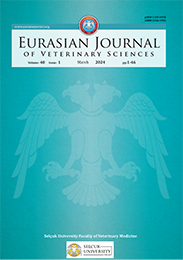| 2024, Cilt 40, Sayı 1, Sayfa(lar) 010-015 | |
| [ Özet ] [ PDF ] [ Benzer Makaleler ] [ Yazara E-Posta ] [ Editöre E-Posta ] | |
| Evaluation of antihyperlipidemic effect of rosemary oil in streptozotocin-induced diabetic rats | |
| Deniz Uluisik, Ercan Keskin | |
| Selcuk Univercity, Veterinary Faculty, Department of Physiology, Konya, Türkiye | |
| Keywords: Diabetes, lipid profile, rats, rosemary | |
| Abstract | |
Aim: In this study, the potential effects of rosemary oil on the lipid profile in
streptozotocin-induced diabetic rats were examined. Materials and Methods: In this study, thirty-two adult male Wistar Albino rats were used. Working groups were consisted as follows: control group (C, n=6), rosemary group (R, n=6), diabetes group (STZ, n=10) and diabetes+rosemary group (STZ+R, n=10). The rosemary oil was administered at oral dosage of 200 mg/kg daily for duration of three weeks in the groups receiving rosemary oil. Diabetes was performed by subcutaneous injections of streptozotocin at dosage of 40 mg/kg in 0.1 M citrate buffer (pH 4.5) for two consecutive days as a single daily dose. At the end of three weeks, blood samples collected from the all animals were assessed lipid parameters. Results: In this study, plasma levels of triglyceride, total cholesterol, and LDLcholesterol significantly elevated, alongside plasma HDL-cholesterol levels in diabetes group significantly reduced compared to the control group. However, upon the application of rosemary oil to streptozotocin-induced diabetic rats, a substantial decrease in plasma triglyceride, total cholesterol, and LDLcholesterol levels was observed, while plasma HDL-cholesterol notably increased. Conclusion: As a result of the current findings, it is concluded that rosemary oil may have antihiperlipidemic properties and could be used as a phytomedicine for the treatment of diabetes. |
|
| [ Başa Dön ] [ Özet ] [ PDF ] [ Benzer Makaleler ] [ Yazara E-Posta ] [ Editöre E-Posta ] | |




